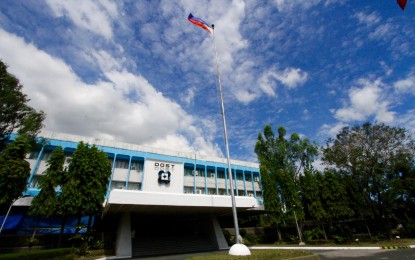
(Photo courtesy of DOST)
MANILA -- The Department of Science and Technology (DOST) is continuously supporting projects to address the coronavirus disease 2019 (Covid-19), an official said Tuesday.
One of the projects that showed potential in Covid-19 cases surveillance was the antibody neutralization assay for new variants of concern.
Funded by the DOST, this project led by Dr. Pia Bagamasbad of the National Institute of Molecular Biology and Biotechnology in UP-Diliman could be developed to do wider testing if ever Covid cases would rise again in the country, said DOST Undersecretary Leah Buendia.
"Amid the Covid-19 pandemic, the country continues to strengthen the DOST programs, reason why we have been more resilient against diseases caused by different microbes. For the past two years, the pandemic taught us the importance of whole-of-government approach," she said in a Laging Handa public briefing.
Buendia cited another DOST-supported project -- the Philippine Genome Center.
"Sa pamamagitan po ng Philippine Genome Center ay nagkaroon po ng biosurveillance ang Covid-19 sa pamamagitan po ng tinatawag na whole genome sequencing ng buong virus, at ito po ay mula doon sa mga pasyente na nagkaroon na po ng Covid-19. Ang layon po dito ay magkaroon at gumamit ng genomic epidemiology perspective o sa pagsubaybay po ng sakit upang magkaroon ng mas malalim na pang-unawa sa pagkalat po ng sakit. (The Philippine Genome Center enables biosurveillance of Covid-19 through what we call whole genome sequencing of the virus. The purpose here is to have and utilize genomic epidemiology perspective in monitoring the disease, to understand deeper how the disease spreads)," she said.
Researchers, Buendia said, are urged to help the government find solutions against diseases.
The DOST is inviting researchers, scientists, engineers, government agencies, the academe and the private sector to be part of research and development (R&D) focusing on various priority areas.
These priority areas include energy, construction, utilities, transportation, food, process, mining and minerals, metals and engineering, advanced materials and nanotechnology, optics and photonics, information and communications technologies, electronics, artificial intelligence (AI), space technology application, convergence of emerging technologies/industry 4.0 and smarter cities, environment, disaster risk reduction-climate change adaptation, unmanned vehicle systems, creative industries, capability development and science communication, agriculture and basic research. (PNA)
